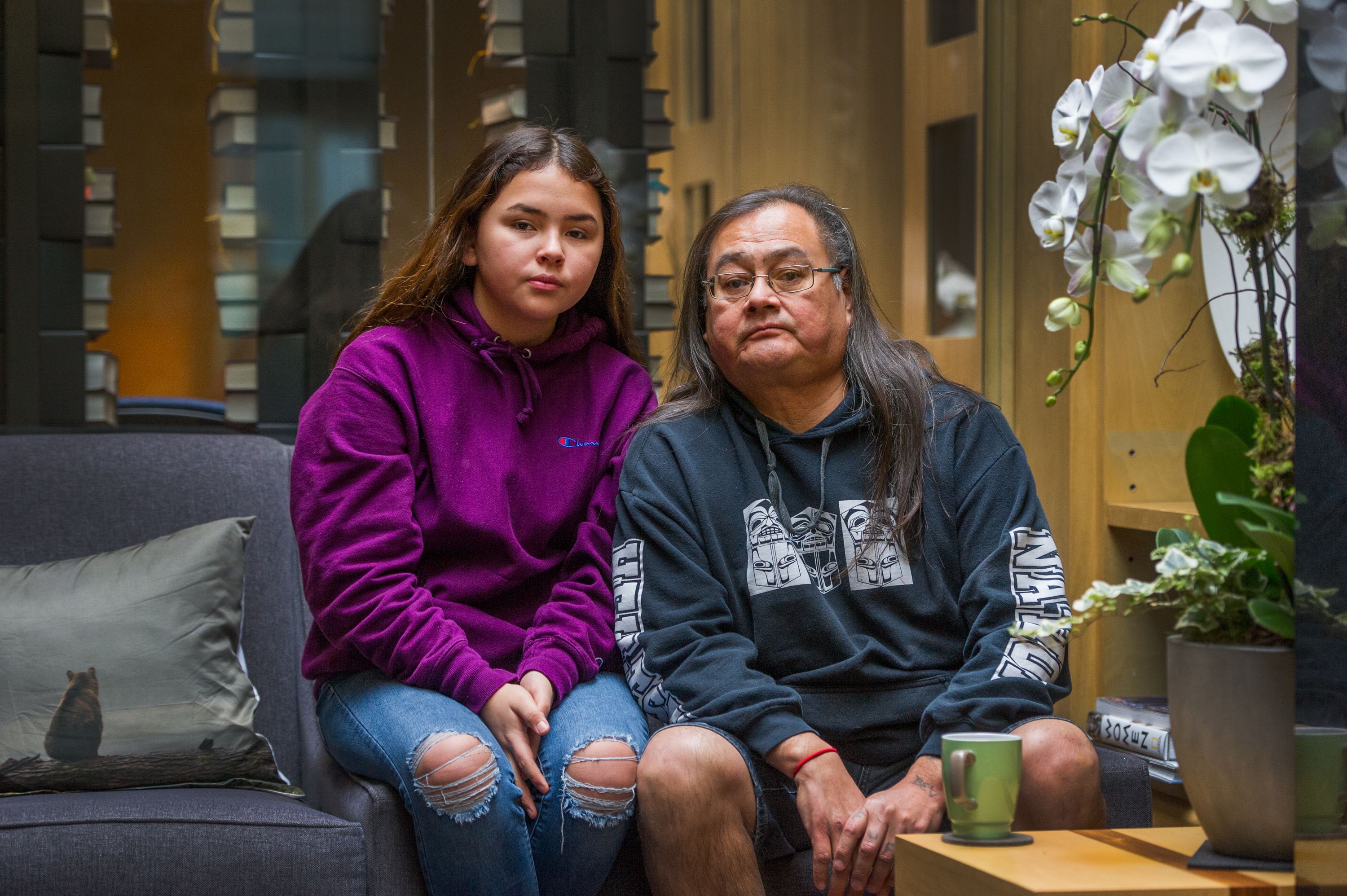'No child should have to ever go through that,' says grandfather of handcuffed girl, 12

Credit to Author: Lori Culbert| Date: Tue, 21 Jan 2020 01:22:20 +0000
Multiple reviews into the wrongful arrest of an Indigenous man and his 12-year-old granddaughter are a step “in the right direction,” but the pair continue to suffer from humiliation and grief after being mistakenly handcuffed outside a Vancouver bank last month.
“My granddaughter is going to be reliving this for a long time,” Maxwell Johnson said Monday while sitting beside Tori, a Grade 7 basketball player from Bella Bella. “It was just so hard to see her crying and so scared and in handcuffs. No child should have to ever go through that.”
Johnson was in a Downtown Vancouver Bank of Montreal branch with Tori and his 20-year-old son, Morgan, on Dec. 20 trying to open a bank account for the girl.
BMO employees questioned the identification the pair presented — government-issued Indian status cards, his birth certificate and her medical card — and called 911 to report a “fraud” in progress. Vancouver police responded and handcuffed both Johnson and his granddaughter, and later released them after confirming there was no crime.
Johnson, who was left in handcuffs for 45 minutes, wasn’t permitted to speak to his granddaughter, who police released from the restraints after confirming her young age. But he could see her crying and was unable to comfort her.
In his first newspaper interview, held Monday at a Vancouver law firm, he recalled that while in cuffs he was worried not only about Tori, but also about his son who witnessed the arrest and phoned his mother to ask her what to do.
“It must have been hard for him to see his dad and his niece being handcuffed and being taken out of the bank by police members,” said Johnson, whose family lives in Bella Bella but travels semi-regularly to Vancouver.
Indigenous leaders and members of the public have responded with outrage to this story, prompting responses from the groups involved. The police department has apologized, and last week explained that “officers decided to use handcuffs to contain the situation while they completed their investigation.” Vancouver Mayor Kennedy Stewart, who chairs the Vancouver Police Board and said he “felt sick” about the incident, pledged that policies would be reviewed to reduce the risk of something similar happening again.
The Office of the Police Complaint Commissioner has asked Delta police to conduct a “thorough and independent investigation” into how Vancouver police handled the situation.
And BMO Financial Group said last week that it’s establishing an advisory council of Indigenous leaders from across Canada. BMO CEO Darryl White said Johnson wasn’t treated with respect or trust, calling what happened “unacceptable.”
“I — and our entire organization — unreservedly apologize for what happened. We simply should not have called the police, regardless of the circumstances,” White said in a statement.
Johnson, a member of the Heiltsuk Nation and an artist, carver and singer, welcomed the probes, but added, “I don’t know if they will be sufficient because they have a lot to learn about First Nations People. It might be going in the right direction.”
After being detained for 45 minutes on the sidewalk outside the bank, Johnson was released and the police apologized but no one from BMO said sorry that day, he recalled. The BMO’s apology and announcement of an advisory panel last week took too much time to come, and meant less because it wasn’t done face-to-face but through the media, said Johnson, 56.
He added he is disappointed the bank hasn’t addressed the issue of whether its employees’ actions were due to racism.
“It makes me think that if I wasn’t a First Nations person, would they have handled it differently? Would they have sat us down inside the bank and asked us questions, rather than taking us outside and putting cuffs on us?” Johnson asked.
Johnson would like, down the road, to have a one-on-one meeting with someone at the bank. He isn’t sure he wants a similar invitation from police, around whom he said he and his granddaughter still feel nervous.
On Monday, the mayor said he expects the police board will discuss its review at Thursday’s meeting: “I am told now that we will have access to, for example, the 911 conversations between BMO and E-Comm, E-Comm and the police, so we can get a sense of how that flowed.”
Questions about the individual conduct of the police officers are in the hands of the complaints commission, Stewart added.
Marilyn Slett, chief councillor of the Heiltsuk Tribal Council, said the Johnson family is focusing first on healing emotionally from this ordeal, but is then considering other options in their journey to seek justice. That could include a formal complaint against the Vancouver police, a human-rights compliant or a civil lawsuit.
Slett, who was also in Vancouver on Monday, said the current police reviews will examine what happened to Johnson and why, but worries they won’t confront the issue of systemic racism. “There needs to be a radical shift in thinking. There needs to be cultural competency training for police officers,” she said.
Regarding BMO, she said the apology addressed what happened at the bank, but didn’t take responsibility for why it happened. “It’s a half-apology. It’s not going to move us forward,” Slett said.
Johnson, a mental-health advocate who has publicly shared his struggles with panic disorder, said this experience has led to anxiety attacks, especially at night when he relives the trauma of the arrest and his granddaughter’s fear.
What has helped him over the last month is the outpouring of support from so many people.
“The support that we have been shown is unbelievable, not only from our community, but from people all over the place. They are saying they are standing behind us, whatever decision we come to try to rectify this,” Johnson said.
Twitter: @loriculbert